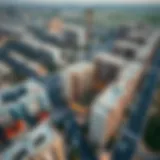Exploring Dubai's Souks: Culture Meets Commerce
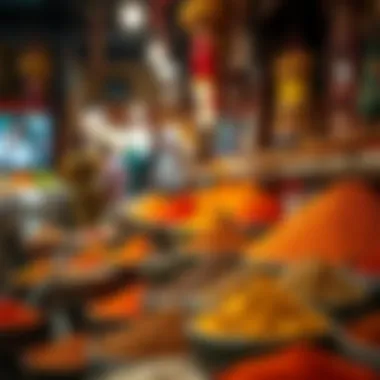
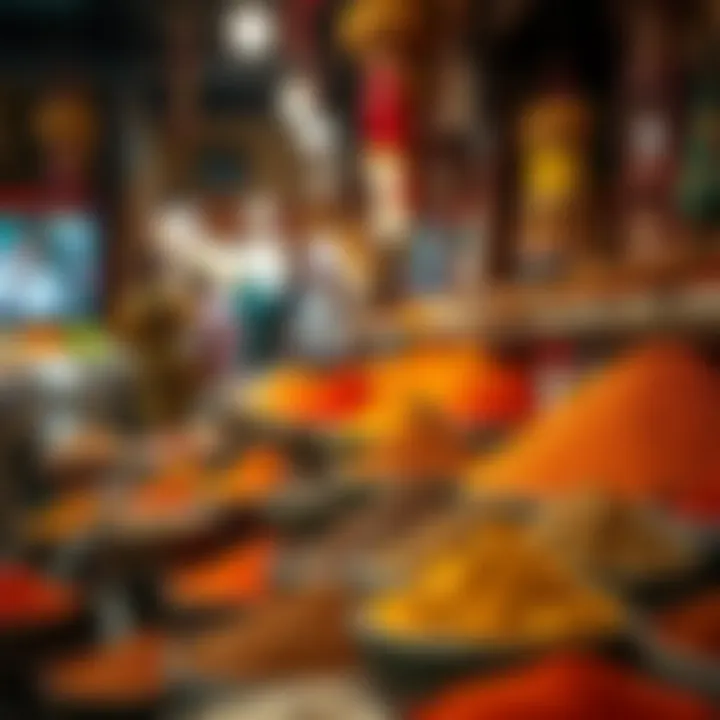
Intro
Dubai's souks are not merely shopping places; they serve as vibrant crossroads where tradition meets modernity. These bustling markets, steeped in history, cater to a diverse array of goods and cultural exchanges, making them significant to both locals and tourists alike. Originating from the city's early trading days, souks like the Gold Souk and Spice Souk represent a rich tapestry of social interactions, commerce, and cultural heritage. In this exploration, we will delve into their evolution, the unique experiences they offer, and how they intertwine with Dubai's booming real estate scene.
Market Insights
Current Market Trends
The atmosphere in the souks reflects broader economic trends within Dubai's market. Currently, there has been a noticeable shift towards integrating technology, with many merchants adopting digital payment options. This change attracts a younger clientele and aligns with Dubai's ambition to be a leading tech hub. On the ground, the lively haggling between buyers and sellers remains as spirited as ever, symbolizing the age-old tradition of bartering that is still very much alive. Visitors to the souks can expect not only to find unique products but also to experience this dynamic conversation of commerce.
Key Economic Indicators
When examining the souks, it's vital to consider their economic impact on the property market. Here are some key indicators that illustrate their importance:
- Increased Foot Traffic: Souks draw millions of tourists each year, boosting local businesses and impacting nearby property values.
- Retail Dynamics: As retail trends evolve, more pop-up shops are surfacing within the souks, showcasing niche products that cater to evolving consumer tastes.
- Cultural Events: Various festivals are often hosted around the souks, enhancing community engagement while indirectly benefiting the real estate sector.
"The souks serve as a microcosm of Dubai's diverse economy, influencing everything from tourism to property value fluctuations."
As the city continues to expand, the synergy between the souks and the property market cannot be overlooked. The growth of high-end residential areas nearby directly correlates with the vibrancy of these markets.
Investment Opportunities
Hot Property Areas
Investing in properties surrounding the souks can tap into a lucrative market. Areas such as Deira offer a blend of historical charm and modern amenities, appealing to both residents and investors. The Al Fahidi District, with its fusion of art and culture, is gaining traction among expatriates and locals alike, making it an attractive prospect for real estate development.
Tips for First-Time Investors
For those considering diving into the property scene around the souks, here are a few tips:
- Research Local Trends: Understanding current market dynamics is crucial. Stay updated with the latest news from sources like The National or Property Finder.
- Consider Community Integration: Properties that resonate with local culture often see higher demand, particularly in tourism-focused areas like the souks.
- Engage with Real Estate Experts: Collaborating with local agents can offer insights into the best investment opportunities and market shifts.
As a hub of culture and commerce, Dubai's souks present a unique landscape for both exploration and investment, intertwining historical significance with modern economic relevance.
The Essence of Dubai's Souks
Dubai's souks are not merely markets; they are the heartbeat of the city, where commerce and culture intertwine in a tapestry of sights, sounds, and smells. The essence of these souks lies in their ability to encapsulate the rich history of trade in the region, providing a window into Dubai’s past while underscoring its modern economic framework. As hubs of activity, they pull in locals and tourists alike, fostering a sense of community that is deeply rooted in tradition yet perfectly in sync with contemporary commercial practices.
What is a Souk?
At its core, a souk is a marketplace, typically characterized by vibrant stalls and bustling crowds. The term traces its roots back to the Arabic word "سوق" (sūq), often used to describe places where trading takes place. Each souk has its own personality, offering unique products that reflect the cultural diversity of Dubai. Whether it is the dazzling displays of gold in the Gold Souk or the aromatic spices wafting from the Spice Souk, these markets present a kaleidoscope of experiences.
A Historical Perspective
Dubai's souks are steeped in history, revealing the city’s evolution from a humble fishing village to a global metropolis. Understanding this journey is essential not just for appreciating the souks but also for grasping Dubai's growth.
The Origins of Souks in the Arabian Peninsula
The origins of souks in the Arabian Peninsula can be traced back to ancient trade routes that crisscrossed the region. These routes allowed merchants not just from the Middle East but also from Asia and Africa to converge in a dynamic exchange of goods and ideas. Souks became gathering spots for traders and travelers, facilitating not only commerce but also cultural interactions. This historical significance is paramount as it highlights the role of souks in creating a melting pot of cultures.
Some key characteristics of early souks include:
- Diverse Goods: From textiles to ceramics, the variety of goods showcased the wealth of artistic traditions in the region.
- Community Centers: Souks acted as social hubs where negotiations were made, and stories were shared.
What makes this aspect compelling for our discussion is how the foundations laid by these ancient markets continue to influence modern Dubai's economy and cultural fabric. The souks have not only survived through the ages but have adapted, proving their enduring relevance.
Development Through the Ages
As Dubai began to modernize in the late 20th century, its souks evolved, yet their essence remained intact. Traditional practices met new economic realities. Streets once bustling with camel caravans transformed into avenues paved with gleaming asphalt, but the souks retained their traditional charm.
A notable development during this period is:
- Expansion of Merchandise: With globalization, the range of products available in the souks expanded significantly, now featuring goods from all over the globe, while still celebrating local artisanship.
- Integration of Technology: Today, many souks are embracing technology, introducing digital payment systems, which enhance the shopping experience without losing the human touch.
The ongoing evolution of the souks serves as a testament to adaptability in a changing world. Their ability to merge tradition with the necessities of modern commerce makes them a focal point in Dubai’s cultural and economic landscape.
Varieties of Souks in Dubai
The souks in Dubai offer an enticing tapestry of culture and commerce, each with its own unique character. Each variety of souk serves not only as a marketplace but also as a cultural touchstone, reflecting the heritage and evolution of the region. Understanding the varieties gives insight into the broader economic and social fabric of Dubai, underscoring the interplay between tradition and modernity.
The Gold Souk
Gold Trading Practices
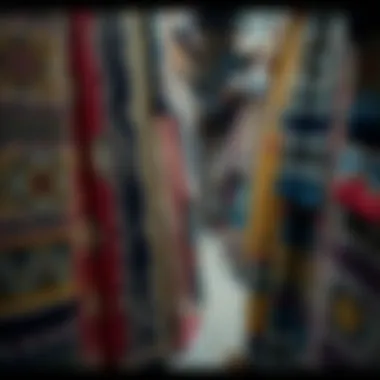
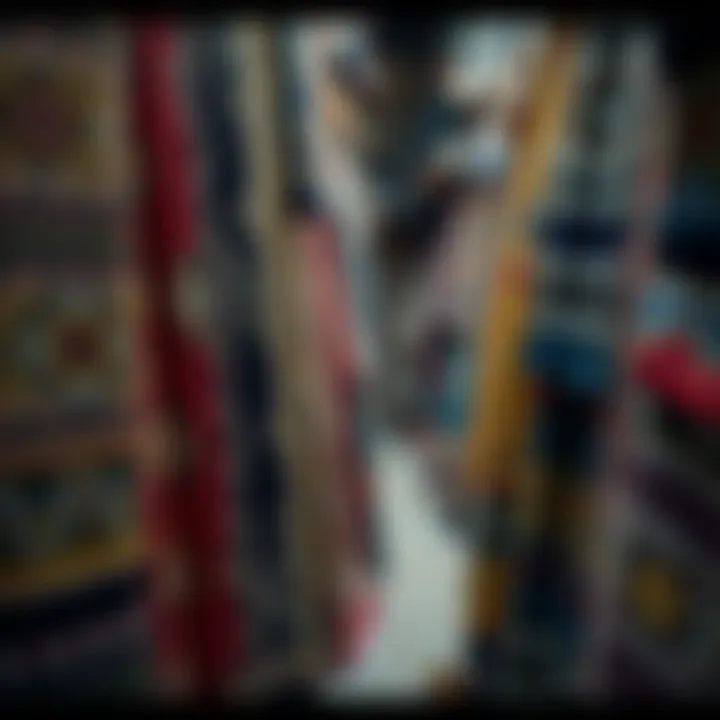
Dubai's Gold Souk is not just a market; it is a bustling hub for gold trading that radiates cultural significance. Here, the gleaming displays of gold and other precious metals draw in both locals and tourists. Gold trading practices in the souk are steeped in history and customs that have evolved with time. For example, buyers are encouraged to understand the karat system. Many traders will offer explanations on the quality and price per gram, facilitating informed purchases. A notable characteristic of gold trading here is the tradition of haggling, where negotiation is seen more as an art than simply a financial exchange.
Such practices benefit this article by highlighting traditional commerce's ongoing relevance, illustrating how it can coexist with modern trading frameworks, and drawing parallels to global markets. However, prospective buyers should remain vigilant about the purity certificates, ensuring authenticity. The allure of bargaining can indeed lead to a more engaging shopping experience.
The Allure of Gold Jewelry
The allure of gold jewelry in Dubai's Gold Souk is hard to ignore. From intricately designed necklaces to simple rings, the options are dazzling. Each piece often tells a story, reflecting not only personal style but also cultural heritage. This allure isn't just about aesthetics; it also encapsulates social status within the local community. In many families, buying gold is a rite of passage, often tied to weddings or celebrations.
Furthermore, the exceptional craftsmanship in gold jewelry sets the Gold Souk apart. Buyers can find unique designs, which can hardly be replicated elsewhere. However, with a myriad of choices, it may overwhelm some shoppers. Local insights can guide you through this rich landscape, helping to make informed decisions. The dual focus on quality and tradition continues to draw individuals from far and wide, making the Gold Souk a must-visit destination.
Spice Souk
Culinary Significance
Dubai's Spice Souk isn't just a feast for the eyes; it’s also a feast for the senses. The rich aromas that waft through the air tell a tale of culinary history. Spices such as saffron, sumac, and cardamom are more than mere ingredients; they are key components of the Emirati cuisine, influencing both local dishes and global gastronomic trends. The significance of spices stretches back centuries and highlights the region's extensive trade networks.
A crucial characteristic of the Spice Souk is its role as a source of high-quality, authentic ingredients. Shoppers can find organic spices, which indicate a shift towards a healthier culinary trend. Although engaging in the sensory explosion of sights and smells is delightful, understanding the properties of each spice can elevate a meal far beyond the ordinary. The communal cookbooks passed down generations often center around these very spices, linking the past with the culinary practices of today.
The Role of Spices in Local Culture
The role of spices in local culture cannot be understated. They symbolize hospitality and community bonding, often appearing in ceremonial meals. Recipes that include these spices have been preserved and passed down, creating a sense of identity among locals. In the Spice Souk, the gathering places for herbalists and traditional medicine can be seen as a gateway to understanding local customs.
Each spice carries its tale, reflecting various influences from Asia, Africa, and beyond. This blend showcases how diverse cultures converged in Dubai, evolving into a distinct culinary narrative. Yet, newcomers may find it challenging to decipher the numerous spice varieties without prior knowledge. Engaging with local vendors often yields insights that not only help in spice choice but also enrich the overall cultural experience.
Textile Souk
Fabrics and Fashion
The Textile Souk stands as a vibrant testament to the interplay between fashion and tradition in Dubai. Bursting with colors, textures, and patterns, this souk attracts fashionistas, designers, and curious travelers alike. The fabric options include everything from silks and cottons to modern synthetic materials, catering to diverse tastes and needs.
A notable aspect of this souk is that it embodies the shift towards sustainable fashion. Locally crafted textiles, often made using traditional techniques, highlight eco-conscious practices. Shoppers can appreciate the stories behind the fabrics, which are often handwoven with cultural significance. However, the sheer variety of materials can sometimes overwhelm, making it advisable for buyers to have an idea of their specific needs beforehand. The promise of finding unique pieces that cannot be replicated commercially is undoubtedly a draw for many.
The Influence of Textile Trade on Dubai’s Identity
The influence of the textile trade on Dubai’s identity is both profound and enduring. Decades of trading fabrics have imbued the city with a rich mosaic of cultural influences that still resonate today. Not only do textiles connect Dubai to its trading past, but they also reflect the cosmopolitan nature of the city.
Textiles play a crucial role in celebrations and cultural heritage, with garments often crafted for occasions ranging from weddings to festivals. However, amid the globalization of fashion, traditional methods and styles face challenges of preservation. Thus, the balance between innovation and tradition emerges as a critical issue. Understanding this context deepens one’s appreciation for the intricate layers that form Dubai's unique character.
"The souks are not just places to shop; they are living testament to Dubai's cultural and economic evolution, weaving together stories from across the globe."
By navigating the varieties of souks in Dubai, one encounters a dynamic interplay of heritage and modern economy, adding richness to the overall understanding of Dubai's vibrant marketplace.
Economic Significance
The souks of Dubai are more than mere marketplaces; they represent a significant facet of the city’s economy. The economic implications of these bustling markets reach far beyond the walls of commerce, weaving into the social fabric and urban development of the region. They serve as vital contributors to local employment and hospitality, providing unique goods and experiences that attract both residents and international tourists alike.
Local Economy and Employment
Job Creation in Traditional Markets
Job creation in traditional markets stands out as a cornerstone of Dubai's economic framework. The souks offer varied employment opportunities, catering not just to traders and shopkeepers but also to craftsmen and service personnel. They embody a space where various skills come together, fostering artisanship that reflects the region's cultural heritage.
A defining characteristic of job creation in these areas is the availability of roles that do not always require formal education. Many individuals find work as vendors or helpers in the souks, allowing them to gain valuable experience and develop a career path that might lead toward greater opportunities. Additionally, the turnover of seasonal employment—especially during festivals or tourism peaks—provides essential income to local families.
This feature of job creation enriches the community by ensuring that many locals can sustain themselves without relocating to other regions. However, there are disadvantages, such as vulnerability in job security, given the often transient nature of tourist demand. This ebb and flow can create fluctuations in employment stability—an aspect that needs addressing as the economy continues to expand.
Impact on Adjacent Businesses
The impact of the souks on adjacent businesses cannot be overstated. These markets act as catalysts for economic growth within their immediate surroundings, benefiting shops, eateries, and hospitality services nearby. The throngs of visitors attracted to the souks often create a domino effect, encouraging people to explore and spend in neighboring enterprises. In a sense, souks act as magnets, pulling traffic that can uplift smaller businesses and spur local commerce.
A key characteristic here is the synergy created between the souks and local businesses. As foot traffic increases in the souks, eateries around them gain more exposure and subsequently more customers. This fosters a vibrant commercial ecosystem, where each element benefits from the vibrancy of the souks. Yet, with this interconnectedness comes potential challenges, such as competition for customers between long-time traditional vendors and new businesses that might pop up in close proximity.
Tourism and Souks
Attraction for Visitors
The attraction of souks for visitors is undeniable and serves as a focal point for Dubai’s tourism industry. These markets showcase the richness of local culture, providing a blend of sights, sounds, and aromas that visitors yearn for. Walking through the stalls, where everything from spices to textiles glistens, creates an immersive experience that captures the essence of Dubai.
One of the unique features of this attraction is the ability to cater to various demographics. Families seek out authentic experiences, while young tourists flock to instagram-worthy backdrops rich in culture. Moreover, from a commercial standpoint, the unique goods offered—be it fine jewelry or traditional handicrafts—often become souvenirs that tourists take back home, making every visit both a memorable experience and a source of income for local artisans.
However, the heavy influx of tourists can sometimes lead to overcrowding and pressure on vendors to maintain quality while adjusting to high demand. Striking a balance between crafting impressive experiences for visitors while preserving local culture remains a continuous process.
Balancing Local Needs and Tourist Expectations
To sustain the longevity of the souks, balancing local needs with tourist expectations presents an ongoing challenge. The authentic experiences that tourists seek often overlap with the needs of locals, who rely on these markets for their livelihoods.
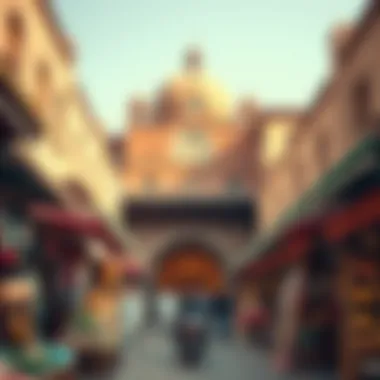
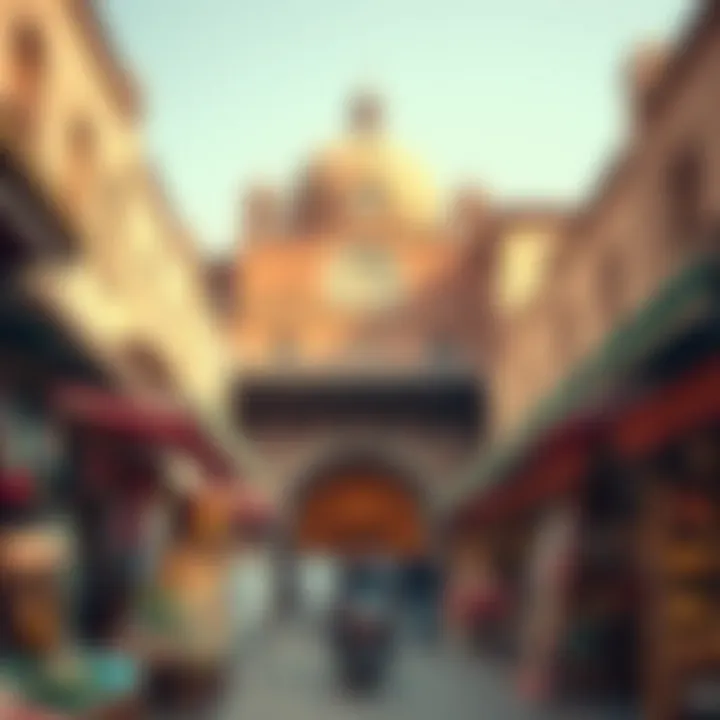
A crucial element in this balancing act is ensuring that the authenticity of the experience is not compromised for the sake of commercial appeal. The culture embedded within the souks plays a central role in what attracts both locals and tourists, so any changes made to accommodate one group must be approached cautiously.
An advantage of fostering this balance includes cultivating a sense of community ownership over the souks. When local voices are included in shaping the experience, it fosters a sense of pride and sustainability. Conversely, neglecting to address the concerns of the local populace can lead to dissatisfaction, undermining the very essence that makes the souks a must-visit destination in Dubai.
In summary, the souks of Dubai not only serve as vital economic hubs but also as reflectors of the rich culture and community spirit that resides within the city. They harness a unique interplay between tradition and modernity, continually adapting to meet the needs of both locals and visitors.
Cultural Interactions
Understanding the cultural interactions that unfold within the souks of Dubai is vital to grasping the full narrative of not only the markets but of the city's identity as a whole. The souks serve as vibrant spaces where commerce and community interlink, shaping social norms and cultural identity.
Souks as Social Spaces
Community Engagement
Community engagement in the souks is a touchstone of Dubai's cultural landscape. These markets are not merely shopping centers; they function as social hubs where people gather to connect, engage, and exchange ideas. This characteristic makes community engagement a key aspect of the souk experience.
Here, local merchants engage with residents and tourists alike. This interaction is done through friendly banter and bargaining, creating a lively atmosphere. The bustling environment fosters relationships, often bringing a sense of belonging among diverse groups.
A unique feature of this community interaction is how it enables cultural exchange. For instance, an Emirati shopkeeper might share stories about the origins of spices sold at his stall, or a tourist could offer insights about their own culture, creating a two-way learning street.
However, there are challenges as well. Rapid modernization and tourism can sometimes overshadow these local interactions. As the souks adapt to attract visitors, there might be concerns about losing genuine community ties. Balancing modern demands with traditional values is crucial for maintaining the essence of these social spaces.
Traditional Practices and Festivals
Traditional practices and festivals in the souks enrich the cultural tapestry of Dubai by celebrating its history and communal ties. These events provide a platform for showcasing local customs, from traditional cooking demonstrations to artisan craft displays. It plays a significant role in creating an ambience that attracts both locals and visitors.
The key characteristic of these practices is their authenticity. Festivals often feature music, dance, and food, engaging the senses and inviting everyone to participate. This communal spirit enhances visitor experience, making them feel part of something larger than themselves.
An example of this would be the annual Dubai Shopping Festival, which takes place mainly across the souks. It showcases not just products but also highlights local crafts and cultures. While benefiting the economy, these festivals may sometimes lead to commercialization, which can dilute the cultural significance of these events
Navigating the Souks
Dubai’s souks are more than just markets; they are cultural landmarks and bustling hubs, rich in history and vibrant with life. Navigating these spaces is both an art and a science, a dance with the rhythm of trade that reflects the heart of the city. Visitors and residents alike find themselves immersed in a sensory experience, from the aroma of spices to the dazzling display of gold. The souks reflect Dubai's essence—where tradition meets modernity, and where every corner offers a new discovery.
The importance of mastering the art of navigation in the souks cannot be understated. It allows for a deeper understanding of the local culture and a more rewarding shopping experience. Not only is it about buying goods, but it encompasses the stories shared, the traditions upheld, and the community spirit that thrives in these markets.
Shopping Strategies
Understanding Haggling
Haggling is not just a way to negotiate price; it’s a practice woven into the fabric of trade in the souks. This age-old tradition goes beyond mere financial transactions—it's a rite of passage for shoppers. Mastering this skill can elevate one’s experience, transforming a simple purchase into an engaging cultural exchange.
The key characteristic of haggling here is that it is expected. Unlike in some Western shopping environments where fixed pricing is the norm, in the souks, merchants and shoppers engage in back-and-forth dialogue. This dialogue not only reveals the pricing structure but also builds a rapport between buyer and seller.
A unique feature of this practice is its ability to foster relationships. When done respectfully, haggling can lead to mutual understanding and even friendship. However, it can also be seen as a disadvantage for those unfamiliar with the practice, as it may feel intimidating or even confrontational at first. Thus, learning the basics of haggling can significantly enhance one's experience in the souks.
Identifying Quality Goods
In a bustling marketplace filled with myriad options, identifying quality goods is a critical strategy. Shoppers need to be discerning, as the difference between genuine craftsmanship and mass-produced items is often subtle but significant.
The key characteristic of recognizing quality lies in attention to detail. Whether it's the intricacy of a handwoven carpet or the craftsmanship of a gold piece, quality is marked by a level of artistry. Shoppers who can spot these differences not only secure better deals but also gain appreciation for the craft.
The unique feature of this pursuit is its dual benefit; not only are buyers acquiring tangible goods, but they are also supporting local artisans and preserving traditional craftsmanship. Still, caution is required, as the vibrant displays can sometimes be misleading. Buyers must rely on both their instincts and knowledge, considering factors like materials used and the reputation of the sellers.
Cultural Etiquette
Respecting Local Customs
Respecting local customs goes a long way in fostering positive interactions within the souks. The markets are steeped in tradition, with unspoken rules that guide behavior. Being aware of these customs enhances the shopping experience and shows appreciation for the local culture.
The key characteristic of this etiquette is its grounding in community values. Local customs, such as greeting shopkeepers with warmth or asking permission before taking photos, are signs of respect. These gestures not only create goodwill but often lead to better deals, as merchants are more inclined to favor courteous customers.
One unique aspect of respecting local customs is that it can act as a bridge between cultures, allowing for meaningful exchanges. However, misunderstanding these nuances can lead to faux pas, highlighting the importance of familiarizing oneself with local practices before venturing into the markets.
Communicating Effectively
Effective communication can transform the way shoppers navigate the souks. It’s not merely about verbal exchanges but understanding body language, cultural nuances, and the art of listening.
The key characteristic of strong communication in this context is its adaptability. Shoppers who can tailor their approach based on the cues they receive from sellers are often rewarded with richer interactions and better bargains. Speaking slowly and clearly, particularly if there is a language barrier, can be advantageous.
Moreover, one unique feature of effective communication is that it often goes beyond language. Many local sellers appreciate simple gestures, such as smiling or nodding, to show their understanding and openness. However, miscommunication can arise from assumptions or stereotypes, so it’s imperative to stay observant and respectful throughout the process.
Navigating the souks of Dubai is an enriching experience that mirrors the city’s blend of tradition and innovation. By employing effective shopping strategies and adhering to cultural etiquette, visitors can connect with the soul of Dubai.
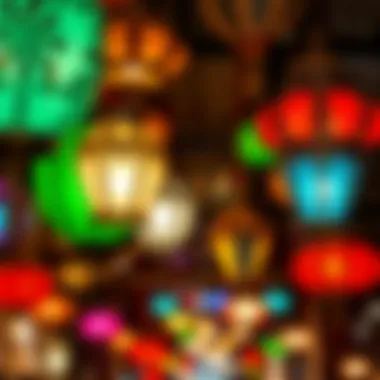
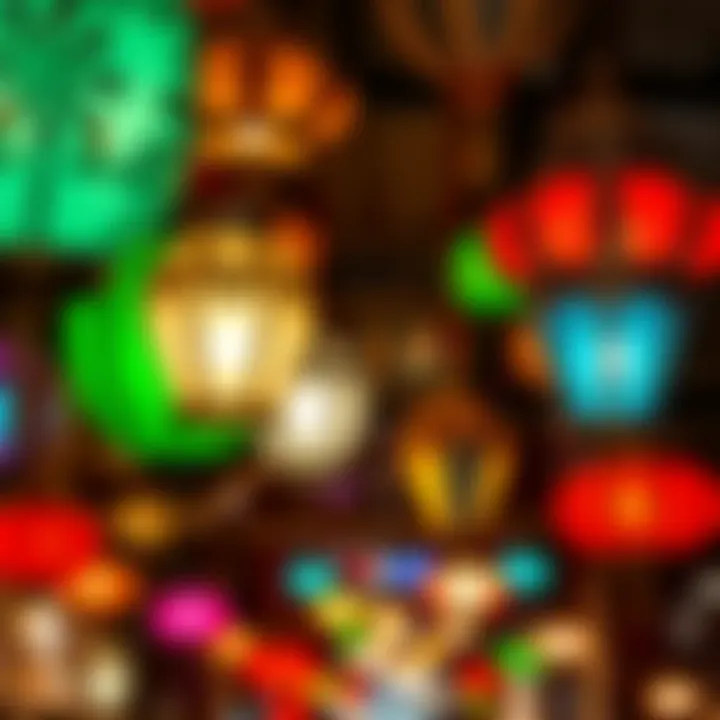
Souks in the Context of Dubai’s Real Estate
The souks of Dubai are more than just markets filled with vibrant colors and enticing aromas; they play a pivotal role in the real estate landscape of the city. Their historical significance and cultural allure contribute to neighborhood appeal, making them integral to property valuations. Understanding how these traditional markets influence the real estate sector can provide insight for investors, developers, and other stakeholders looking to navigate this dynamic landscape.
Impact on Property Values
Locating properties near souks has been shown to elevate market values significantly. The vibrancy of these markets creates a lively environment that attracts both residents and tourists alike. Areas surrounding souks often see high demand due to the convenience of proximity to local goods, food, and cultural experiences. Such proximity contributes positively to property appreciation, making these neighborhoods desirable for potential buyers.
- Enhanced Neighborhood Prestige: Living near a souk can add a certain charm and prestige to a property, as many see these areas as culturally rich.
- Increased Foot Traffic: High foot traffic supports local businesses, enhancing the overall economic vitality of the area,
- Accessibility and Convenience: Residents appreciate having essential services nearby, including grocery items and artisan products that contribute to their quality of life.
"Investing in property near a souk is like finding a goldmine; the foot traffic alone can increase your property’s value over time."
The Role of Souks in Urban Development
In recent years, souks have also been central to urban development initiatives aimed at preserving cultural heritage while accommodating modern infrastructure.
Planning and Infrastructure
The integration of planning and infrastructure into the development of souks is crucial. Authorities prioritize sustainable development while ensuring that the markets retain their traditional charm. A core characteristic of this approach is the careful balance between modernization and preservation.
- Strategic Urban Planning: Ensures that new infrastructure respects the traditional layouts and structures found in souks.
- Public Transport Access: Enhances connectivity, allowing for easy access to these cultural hubs.
However, the challenge lies in ensuring that expansions do not over-commercialize or dilute the essence of these markets.
Preserving Cultural Heritage Amidst Modernization
Preserving cultural heritage while adapting to urban growth is a delicate balancing act. This aspect highlights the need for conscious efforts to maintain the souks' unique character in the face of skyscrapers and modern amenities. Key elements include:
- Community Engagement: Encouraging local participation in planning to ensure that their needs and traditions are reflected.
- Cultural Initiatives: Promoting arts and crafts tied to the souks to maintain their historical significance.
Finding that equilibrium is beneficial; it safeguards cultural identity while promoting economic progress. The adept melding of these factors contributes significantly to the market’s overall attractiveness.
With the future trajectory of Dubai aiming for a blend of tradition and modernity, the souks stand as versatile pillars of both property value enhancement and urban development.
Future Perspectives
While Dubai's souks represent a bridge to the past, their future holds significant importance, especially in an era marked by rapid change. The cultural and economic landscapes of these marketplaces must adapt to emerging trends while ensuring they maintain their unique identity. By understanding the dynamics of sustainability and the impact of e-commerce, stakeholders can shape a viable path forward.
Sustainability in Souks
Maintaining Tradition in a Modern Context
The challenge of keeping tradition alive in Dubai's souks cannot be understated. As the city modernizes, these markets must find a way to honor their heritage while appealing to contemporary needs. This balancing act tends to be beneficial for local businesses, as it resonates deeply with both residents and tourists seeking authentic experiences. A key characteristic of this approach lies in preserving traditional craftsmanship. Utilizing local materials and skills not only supports artisans but also connects consumers with the rich history behind the products.
Maintaining this tradition often involves integrating modern marketing strategies while staying true to the essence of the souk. For instance, local vendors can use social media to showcase their crafts, attracting a broader audience while promoting their heritage. However, one must tread carefully. Rapid commercialization poses a risk of overshadowing authentic practices, so careful consideration is vital.
Environmental Considerations
In an age where environmental concerns are paramount, the souks of Dubai also face scrutiny over their sustainability practices. Reducing environmental impact while maintaining vibrant markets is crucial. The growth of eco-friendly products and practices presents an opportunity for the souks to align with global trends favoring sustainability. This aligns perfectly with Dubai’s vision of becoming a greener city.
One unique feature of focusing on environmental considerations is the promotion of local goods. Sourcing products locally reduces transportation emissions, highlighting an eco-conscious narrative that can attract environmentally-aware shoppers. However, challenges exist, such as the higher costs associated with sustainable practices, which may deter some vendors. Balancing costs with eco-friendly approaches could define the future landscape of the souks.
The Rise of E-commerce and Its Effect
Adapting to Digital Trends
With the digital world continuing to grow, adapting to these changes is no longer optional but essential. E-commerce has revolutionized how businesses operate, offering a foothold for souk merchants to expand their reach beyond traditional boundaries. By setting up online platforms, local vendors can engage with customers who may not venture into the physical markets.
This digital transition brings profound benefits. It enables vendors to leverage data analytics for better inventory management, thus minimizing waste. However, it also presents challenges, such as needing technological know-how and the risk of losing face-to-face customer interactions, which are a vital part of the traditional souking experience.
Future of Traditional Markets
The existence of traditional markets in an increasingly digital world is a topic of debate. Many argue that live, dynamic marketplaces provide unique experiences that online shopping cannot replicate. These spaces are central to community engagement and cultural exchange, vital elements that the souks must strive to protect.
The future likely involves a hybrid model, combining the physical and digital realms. Offering customers an option to shop online while enriching traditional experiences through physical visits could attract a new demographic while retaining the essence of cultural markets. However, a critical focus on how to sustain the traditional atmosphere in this hybrid approach will dictate its success.
In summary, the future perspectives of Dubai's souks intertwine sustainability and adaptation to digital trends. This blend will ensure that these markets not only survive but thrive in an ever-evolving landscape, making them vibrant components of the city's identity.
Closure
The completion of this exploration into Dubai's souks draws attention to their multidimensional significance in the city’s cultural and economic tapestry. The souks are not merely marketplaces; they embody a confluence of history, tradition, and modernity. Their vibrant atmosphere fosters a sense of connection, both among locals and visitors, facilitating social interactions that transcend the mere act of buying and selling.
Summarizing the Importance of Souks
The various souks of Dubai serve several essential roles:
- Cultural Preservation: They hold the essence of traditional Arabian life, showcasing authentic crafts and local customs, thereby preserving cultural heritage amidst rapid globalization.
- Economic Engines: Functioning as vital economic hubs, these markets contribute significantly to local employment opportunities. They also create a unique shopping experience that draws tourists, supporting adjacent businesses and establishing a robust circular economy.
- Community Centers: The souks are social spaces where communities can gather, share stories, and celebrate festivals, enhancing local bonds and promoting a sense of unity.
As Dubai navigates its journey of modernization, maintaining the integrity of its souks stands as a testament to the balance between embracing the future and cherishing the past.
This understanding not only enriches the urban experience for residents and tourists alike but also enhances property values and social cohesion, offering pathways to a prosperous future that honors the city's rich past.
